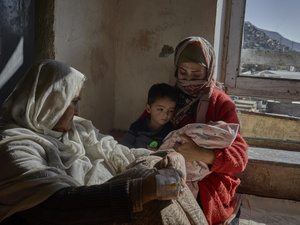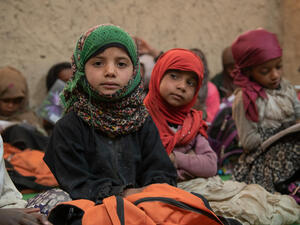UNHCR distributes aid to 5,000 people in Somali town of Baidoa
UNHCR distributes aid to 5,000 people in Somali town of Baidoa

An internally displaced Somali and her child with non-food items distributed by UNHCR. The refugee agency has been handing out supplies in the town of Baidoa.
BAIDOA, Somalia, August 21 (UNHCR) - The UN refugee agency on Tuesday completed the distribution of basic supplies to some 5,000 displaced people living in makeshift shelters in the southern Somalia town of Baidoa.
The distribution of plastic sheeting for shelter, blankets, jerry cans and kitchen utensils started last Sunday and was completed on Tuesday morning. The 5,000 people from 1,000 families who received supplies during this distribution round are among the estimated 4,000 displaced families living in settlements in and around Baidoa, a market town and seat of Somalia's interim parliament.
Some of the internally displaced people (IDPs) targeted during the distribution arrived recently in Baidoa from Mogadishu - 255 kilometres to the south-east - and other areas of south and central Somalia which have been affected by fighting.
"We completed the distribution successfully this morning, but were still not able to meet all the needs. Some families are still without shelter material, while many of the IDP sites lack health services, water and sanitation," said a UNHCR official in Baidoa.
A growing concern for Baidoa's largely agricultural community has been the poor rainfall. "People depend on rainfall for farming activities. But this time the rains were not good, which means that people cannot work on their farms. They depend wholly on their farms and now they have no alternative," the official explained.
Meanwhile, UNHCR operations in the town of Galkayo remain severely curtailed following the evacuation in early August of staff working for international non-governmental organizations, including implementing partners of the refugee agency.
The decision to remove staff from Galkayo and the northern region of Puntland followed threats against expatriate staff. UNHCR relocated staff from Galkayo to Garowe, some 200 kms to the north. They are waiting for security to improve so that they can return to help some 50,000 IDPs around Galkayo.
In a further development, UNHCR is finalizing plans for the repatriation in October of a last group of some 2,000 Somali refugees living in camps in Djibouti. The refugees are from north-west Somalia, or Somaliland.









